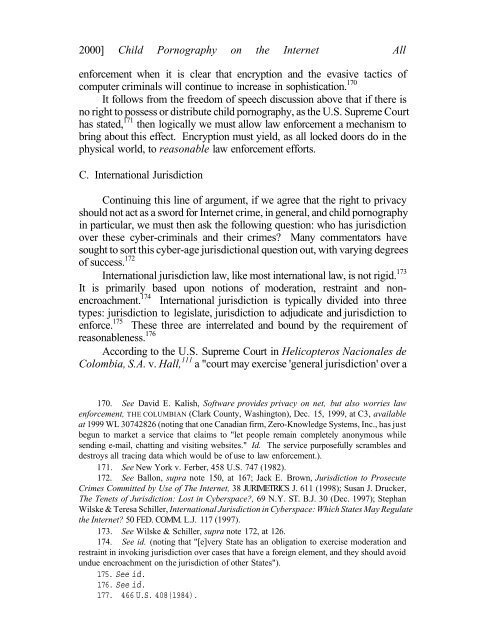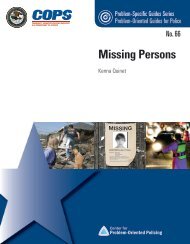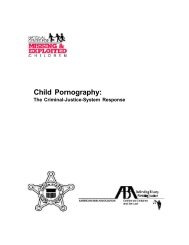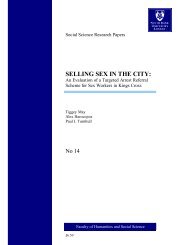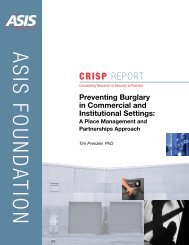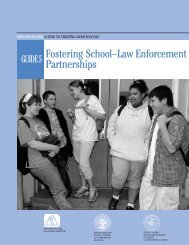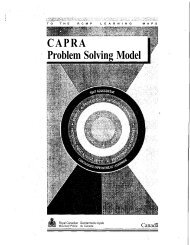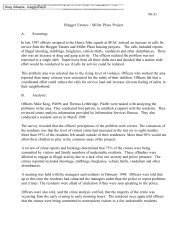uncovering and eliminating child pornography rings on the internet
uncovering and eliminating child pornography rings on the internet
uncovering and eliminating child pornography rings on the internet
You also want an ePaper? Increase the reach of your titles
YUMPU automatically turns print PDFs into web optimized ePapers that Google loves.
2000] Child Pornography <strong>on</strong> <strong>the</strong> Internet All<br />
enforcement when it is clear that encrypti<strong>on</strong> <str<strong>on</strong>g>and</str<strong>on</strong>g> <strong>the</strong> evasive tactics of<br />
computer criminals will c<strong>on</strong>tinue to increase in sophisticati<strong>on</strong>. 170<br />
It follows from <strong>the</strong> freedom of speech discussi<strong>on</strong> above that if <strong>the</strong>re is<br />
no right to possess or distribute <str<strong>on</strong>g>child</str<strong>on</strong>g> <str<strong>on</strong>g>pornography</str<strong>on</strong>g>, as <strong>the</strong> U.S. Supreme Court<br />
has stated, 171 <strong>the</strong>n logically we must allow law enforcement a mechanism to<br />
bring about this effect. Encrypti<strong>on</strong> must yield, as all locked doors do in <strong>the</strong><br />
physical world, to reas<strong>on</strong>able law enforcement efforts.<br />
C. Internati<strong>on</strong>al Jurisdicti<strong>on</strong><br />
C<strong>on</strong>tinuing this line of argument, if we agree that <strong>the</strong> right to privacy<br />
should not act as a sword for Internet crime, in general, <str<strong>on</strong>g>and</str<strong>on</strong>g> <str<strong>on</strong>g>child</str<strong>on</strong>g> <str<strong>on</strong>g>pornography</str<strong>on</strong>g><br />
in particular, we must <strong>the</strong>n ask <strong>the</strong> following questi<strong>on</strong>: who has jurisdicti<strong>on</strong><br />
over <strong>the</strong>se cyber-criminals <str<strong>on</strong>g>and</str<strong>on</strong>g> <strong>the</strong>ir crimes? Many commentators have<br />
sought to sort this cyber-age jurisdicti<strong>on</strong>al questi<strong>on</strong> out, with varying degrees<br />
of success. 172<br />
Internati<strong>on</strong>al jurisdicti<strong>on</strong> law, like most internati<strong>on</strong>al law, is not rigid. 173<br />
It is primarily based up<strong>on</strong> noti<strong>on</strong>s of moderati<strong>on</strong>, restraint <str<strong>on</strong>g>and</str<strong>on</strong>g> n<strong>on</strong>encroachment.<br />
174 Internati<strong>on</strong>al jurisdicti<strong>on</strong> is typically divided into three<br />
types: jurisdicti<strong>on</strong> to legislate, jurisdicti<strong>on</strong> to adjudicate <str<strong>on</strong>g>and</str<strong>on</strong>g> jurisdicti<strong>on</strong> to<br />
enforce. 175 These three are interrelated <str<strong>on</strong>g>and</str<strong>on</strong>g> bound by <strong>the</strong> requirement of<br />
reas<strong>on</strong>ableness. 176<br />
According to <strong>the</strong> U.S. Supreme Court in Helicopteros Naci<strong>on</strong>ales de<br />
Colombia, S.A. v. Hall, 111 a "court may exercise 'general jurisdicti<strong>on</strong>' over a<br />
170. See David E. Kalish, Software provides privacy <strong>on</strong> net, but also worries law<br />
enforcement, THE COLUMBIAN (Clark County, Washingt<strong>on</strong>), Dec. 15, 1999, at C3, available<br />
at 1999 WL 30742826 (noting that <strong>on</strong>e Canadian firm, Zero-Knowledge Systems, Inc., has just<br />
begun to market a service that claims to "let people remain completely an<strong>on</strong>ymous while<br />
sending e-mail, chatting <str<strong>on</strong>g>and</str<strong>on</strong>g> visiting websites." Id. The service purposefully scrambles <str<strong>on</strong>g>and</str<strong>on</strong>g><br />
destroys all tracing data which would be of use to law enforcement.).<br />
171. See New York v. Ferber, 458 U.S. 747 (1982).<br />
172. See Ball<strong>on</strong>, supra note 150, at 167; Jack E. Brown, Jurisdicti<strong>on</strong> to Prosecute<br />
Crimes Committed by Use of The Internet, 38 JURIMETRICS J. 611 (1998); Susan J. Drucker,<br />
The Tenets of Jurisdicti<strong>on</strong>: Lost in Cyberspace?, 69 N.Y. ST. B.J. 30 (Dec. 1997); Stephan<br />
Wilske & Teresa Schiller, Internati<strong>on</strong>al Jurisdicti<strong>on</strong> in Cyberspace: Which States May Regulate<br />
<strong>the</strong> Internet? 50 FED. COMM. L.J. 117 (1997).<br />
173. See Wilske & Schiller, supra note 172, at 126.<br />
174. See id. (noting that "[e]very State has an obligati<strong>on</strong> to exercise moderati<strong>on</strong> <str<strong>on</strong>g>and</str<strong>on</strong>g><br />
restraint in invoking jurisdicti<strong>on</strong> over cases that have a foreign element, <str<strong>on</strong>g>and</str<strong>on</strong>g> <strong>the</strong>y should avoid<br />
undue encroachment <strong>on</strong> <strong>the</strong> jurisdicti<strong>on</strong> of o<strong>the</strong>r States").<br />
175. See id.<br />
176. See id.<br />
177. 466 U.S. 408(1984).


